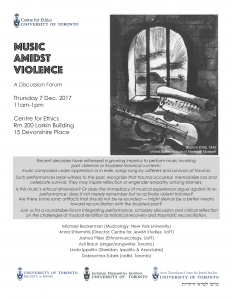
Recent decades have witnessed a growing impetus to perform music invoking past violence or troubled historical contexts: music composed under oppression or in exile, songs sung by sufferers and survivors of trauma. Such performances bear witness to the past, recognize that trauma occurred, memorialize loss and celebrate survival. They may inspire reflection or engender empathy among listeners.
Is this music’s ethical dimension? Or does the immediacy of musical experience argue against its re-performance: does it not merely remember but re-activate violent histories? Are there some sonic artifacts that should not be re-sounded –– might silence be a better means toward reconciliation with the troubled past?
Join us for a roundtable-forum integrating performance with scholarly discussion and critical reflection on the challenges of musical rendition as historical recovery and traumatic reconciliation.
Participants:
- Michael Beckerman (Musicology, New York University) is an eminent scholar of Central and Eastern European music of the 19C and 20C, Jewish music, music in contexts of war, and music in the concentration camps.
- Anna Shternshis (Director, Centre for Jewish Studies, University of Toronto) is an expert on Jewish culture in the Soviet Union.
- Joshua Pilzer (Ethnomusicology, University of Toronto) specializes in the relationships between music, survival, memory, and traumatic experience, with a focus on the anthropology of music in modern Korea and Japan.
- Adi Braun (singer-songwriter, Toronto) and Linda Ippolito (Sheridan, Ippolito & Associates, Toronto) have been researching the music and performers of the politically progressive Weimar-era cabaret for Braun’s new album Moderne Frau (2017).
- Dobrochna Zubek (cello, Toronto) is an award-winning Polish musician whose multifaceted international career encompasses solo, chamber, orchestral and interdisciplinary performance.
Hosted by:



Thu, Dec 7, 2017
11:00 AM - 01:00 PM
Centre for Ethics, University of Toronto
Rm 200, Larkin Building
